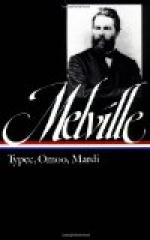“Yes, so they say, Yoomy; but if all boors be the immortal sires of endless dynasties of immortals, how little do our pious patricians bear in mind their magnificent destiny, when hourly they scorn their companionship. And if here in Mardi they can not abide an equality with plebeians, even at the altar; how shall they endure them, side by side, throughout eternity? But since the prophet Alma asserts, that Paradise is almost entirely made up of the poor and despised, no wonder that many aristocrats of our isles pursue a career, which, according to some theologies, must forever preserve the social distinctions so sedulously maintained in Mardi. And though some say, that at death every thing earthy is removed from the spirit, so that clowns and lords both stand on a footing; yet, according to the popular legends, it has ever been observed of the ghosts of boors when revisiting Mardi, that invariably they rise in their smocks. And regarding our intellectual equality here, how unjust, my lord, that after whole years of days end nights consecrated to the hard gaining of wisdom, the wisest Mardian of us all should in the end find the whole sum of his attainments, at one leap outstripped by the veriest dunce, suddenly inspired by light divine. And though some hold, that all Mardian lore is vain, and that at death all mysteries will be revealed; yet, none the less, do they toil and ponder now. Thus, their tongues have one mind, and their understanding another.”
“My lord,” said Mohi, “we have come to the lees; your pardon, Babbalanja.”
“Then, Vee-Vee, another calabash! Fill up, Mohi; wash down wine with wine. Your cup, Babbalanja; any lees?”
“Plenty, my lord; we philosophers come to the lees very soon.”
“Flood them over, then; but cease not discoursing; thanks be to the gods, your mortal palates and tongues can both wag together; fill up, I say, Babbalanja; you are no philosopher, if you stop at the tenth cup; endurance is the test of philosophy all Mardi over; drink, I say, and make us wise by precept and example.—Proceed, Yoomy, you look as if you had something to say.”
“Thanks, my lord. Just now, Babbalanja, you flew from the subject;— you spoke of boors; but has not the lowliest peasant an eye that can take in the vast horizon at a sweep: mountains, vales, plains, and oceans? Is such a being nothing?”
“But can that eye see itself, Yoomy?” said Babbalanja, winking. “Taken out of its socket, will it see at all? Its connection with the body imparts to it its virtue.”
“He questions every thing,” cried Mohi. “Philosopher, have you a head?”
“I have,” said Babbalanja, feeling for it; “I am finished off at the helm very much as other Mardians, Mohi.”
“My lord, the first yea that ever came from him.”
“Ah, Mohi,” said Media, “the discourse waxes heavy. I fear me we have again come to the lees. Ho, Vee-Vee, a fresh calabash; and with it we will change the subject. Now, Babbalanja, I have this cup to drink, and then a question to propound. Ah, Mohi, rare old wine this; it smacks of the cork. But attention, Philosopher. Supposing you had a wife—which, by the way, you have not—would you deem it sensible in her to imagine you no more, because you happened to stroll out of her sight?”




